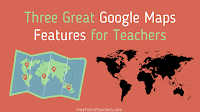18 Feb Three Great Google Maps Features for Teachers
Google Maps is one of my favorite tools to use in history and geography lessons. I’ve been using it for at least as long as I’ve been writing this blog (15 years). Like all Google products it has evolved over time and some features have gone away while others have been added. And there are some features that are “hidden” in plain sight that can be helpful when creating lessons that incorporate the use of Google Maps.
In this new video I demonstrate three great features of Google Maps that are helpful when creating and conducting history and geography lessons.
In the video I demonstrate:
- How to create and share lists of places with your students.
- How to share specific Street View imagery.
- How to use different base layers in Google Maps.
Google Maps is one of my favorite tools to use in history and geography lessons. I’ve been using it for at least as long as I’ve been writing this blog (15 years). Like all Google products it has evolved over time and some features have gone away while others have been added. And there are some features that are “hidden” in plain sight that can be helpful when creating lessons that incorporate the use of Google Maps. In this new video I demonstrate three great features of Google Maps that are helpful when creating and conducting history and geography lessons. In the video I demonstrate: How to create and share lists of places with your students. How to share specific Street View imagery. How to use different base layers in Google Maps. To learn even more about how to use Google Maps and Google Earth in your classroom, enroll in A Crash Course in Google Earth & Maps for Social Studies. Are you a tech coach or media specialist looking for some new ideas to share with your colleagues? If so, 50 Tech Tuesday Tips is an eBook you need. You can get it right here.


Sorry, the comment form is closed at this time.